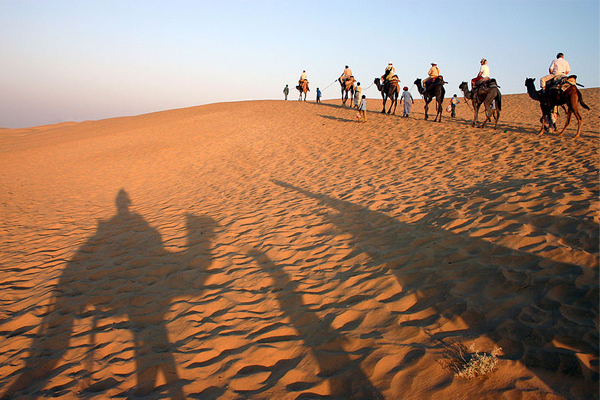Fatima Sugapong has been studying abroad and reporting in Morocco with the program, SIT: Field Studies in Journalism and New Media.
Check out the “Reporting Morocco” website here: http://reportingmorocco.org/

I’ve always been a city girl: big populations, speeding cars and just all around fast–paced living was all I thought I needed in life.
Last week my program went on a southern excursion. We visited so many cities, whose names I can hardly remember. The cities we actually spent some time in were Fez, Azrou, Merzouga Desert, Rissani, Tinghir, Ouarzazate, Marrakech and Essaouira.
The most euphoric night of my life, though, was spent in the Merzouga Desert.
After a horrendous seven-hour bus ride through winding roads and rough terrain, we made it to the most tranquil and naturally intriguing place I have ever seen. We took land rovers over to the camp site. It was like a real life 45 minute Indiana Jones ride. I almost smacked my head on the roof of the car about five times. The seatbelts didn’t keep my bum from flying off of my seat.
The deeper into the desert we got, the more we lost sight of the traditional Moroccan cities we left behind. There were hardly any buildings, just sand dunes and clouds. To our surprise, we were staying in the fanciest tents, compliments of the four-star hotel next to them. Our tents were huddled together with two or three mattresses inside and even a light. There were Moroccan rugs lining the spaces in between the tents, which made for luxurious star-gazing and singing around the camp fire.
We spent about two seconds admiring this innovative hotel, through our backpacks in our tents and ran to our camels.
Each of us named our camels. Mine was named Sweetness.
We all got on our camels and exhaled an exasperated “WOAH” when they stood up. Then it hit me. I’m on a camel! As a group, we rode our camels through the desert and laughed and sang along to “Happy” by Pharrell Williams (compliments of my program director).
We stopped in the middle of nowhere, where there was nothing but sand dunes and silence. We clumsily climbed to the top of one sand dune and stood there to catch our breath and absorb where we were. Before we could fall into our awe, our program director said, “Who wants to roll down the sand dune?”
I stood there with my mouth wide open…what?
Everyone rushed to take their shoes and turbans off and tucked and rolled. Before I could even make a final decision my program director pushed me and I rolled half way down so quickly I didn’t even know what happened — it was awesome.
Now, with sand in every possible place on our persons, we made the trek back to our camels.
The ride back was completely silent. After such a rigorous program, we all finally submitted to our exhaustions and then reaped our rewards. I was the happiest I had ever been in my life. Homesickness, stress and even motion sickness couldn’t touch us.
The sand dunes looked like a painter left behind a simple stroke of his brush. It was hard for me to believe it was even real. But nevertheless, I was there. I questioned exactly how I managed to get here and it left my mind just as quickly as it came. None of it mattered.
After our camel ride, I walked ahead of the group to find a Gnaouan music group was waiting for us. Gnaouan music is traditional music that is sung by sub-Saharan African tribes. It originated from the period of slavery and was a form of liberation. They only use three instruments: large iron castanets (qraqab), three-string lute (hajhuj) and big bass drums. This form of music trickled down the ancestry line and met us here, in the Merzouga Desert. One of the hotel employees handed me mint tea and cookies. The second I stepped onto the carpet the band started playing.
Before we could even sit down, the hotel employees, adorned in their traditional Saharawi turbans and djellabas, pulled us back up and had us dance around the camp fire with them. When the music stopped, we almost forgot to stop dancing.
But it was dinner time and we were hungry.
After dinner we were treated to one last performance. We all sat around the campfire while they sang us their traditional songs.
Fatima Sugapong has been studying abroad and reporting in Morocco with the program, SIT: Field Studies in Journalism and New Media.
Check out the “Reporting Morocco” website here: http://reportingmorocco.org/


